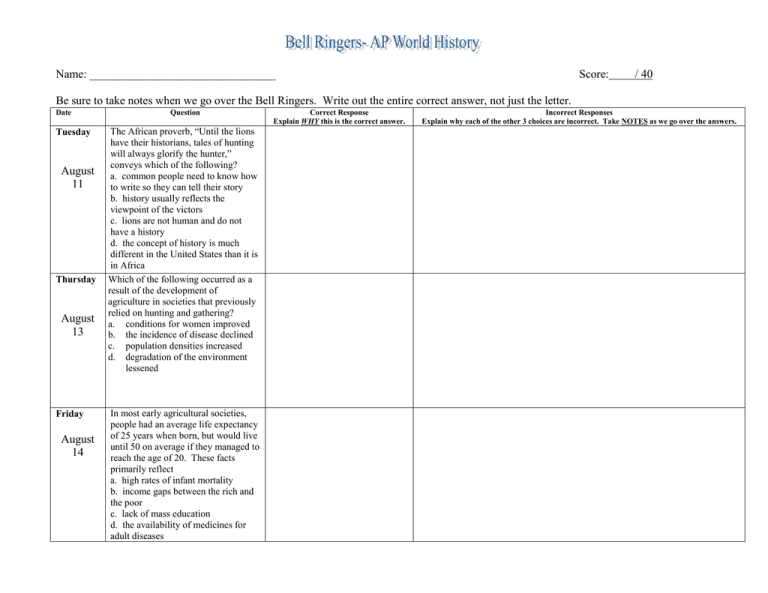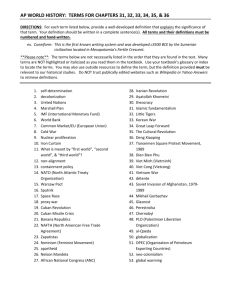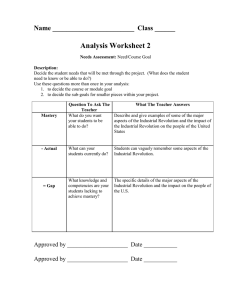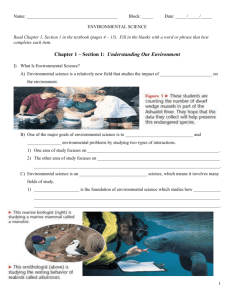Name: ________________________________
advertisement

Name: ________________________________ Score: / 40 Be sure to take notes when we go over the Bell Ringers. Write out the entire correct answer, not just the letter. Date Tuesday August 11 Thursday August 13 Friday August 14 Question The African proverb, “Until the lions have their historians, tales of hunting will always glorify the hunter,” conveys which of the following? a. common people need to know how to write so they can tell their story b. history usually reflects the viewpoint of the victors c. lions are not human and do not have a history d. the concept of history is much different in the United States than it is in Africa Which of the following occurred as a result of the development of agriculture in societies that previously relied on hunting and gathering? a. conditions for women improved b. the incidence of disease declined c. population densities increased d. degradation of the environment lessened In most early agricultural societies, people had an average life expectancy of 25 years when born, but would live until 50 on average if they managed to reach the age of 20. These facts primarily reflect a. high rates of infant mortality b. income gaps between the rich and the poor c. lack of mass education d. the availability of medicines for adult diseases Correct Response Explain WHY this is the correct answer. Incorrect Responses Explain why each of the other 3 choices are incorrect. Take NOTES as we go over the answers. Be sure to take notes when we go over the Bell Ringers. Date Monday August 17 Tuesday August 18 Wednesday August 19 Question Which of the following is a major feature of the Neolithic Revolution in the Middle East? a. the spread of a migratory way of life b. the establishment of sedentary village communities c. a decline in the total population in the area d. an increase in the amount of forested land Which of the following best explains why myths are useful to historians? a. myths clarify how ancient technology was used b. myths analyze how great heroes created the fist societies c. myths give detailed plans showing how ancient leaders achieved power d. myths provide insights into the values and traditions of the society The steppe tribes of Central Asia differed from the societies in Mesopotamia, China, and India mainly because: a. the steppe tribes developed more complex social structures b. Mesopotamia, China, and India developed monumental architecture c. the steppe tribes were monotheistic d. Mesopotamia, China, and India were less concerned with science and art Correct Response Explain WHY this is the correct answer. Incorrect Responses Explain why each of the other 3 choices are incorrect. Take NOTES as we go over the answers. Date Thursday August 20 Friday August 21 Question Copy the entire question Correct Response Explain WHY this is the correct answer. Incorrect Responses Explain why each of the other 3choices are incorrect. Take NOTES as we go over the answers. Source: Genoveva Hernández Díaz, age seventeen, teenage daughter of a Cuban revolutionary, interview, 1970. “Before the Revolution, women didn’t have as many opportunities as they do now. If they weren’t prostitutes, or mistresses to military men or to some boss, they didn’t have a chance. The only other opportunity was to be a servant. But now women are independent, free. A woman can work in the daytime and go to night school. Who ever studied before the Revolution? What money did they have? What facilities to study? Lots of older women who think women’s liberation is terrible because women go in the street like men and do men’s work. Those women never learned anything useful to themselves or to the Revolution. They regard liberation as a hell. I think it’s a good thing because now women are equal to men.” Read the excerpt to the left. Answer the following questions: 1. What does Genoveva’s account reveal about the status of women during the Cuban Revolution? How has the status of women changed? The Chinese concept “Mandate of Heaven” was sometimes used to justify: a. widow immolation b. reincarnation c. monogamy d. rebellion 2. How might Genoveva’s point of view (POV) affect her perspective on the Cuban Revolution? 3. Why do the older women not approve of the revolution? What might make these women feel this? 4. Who would we need to hear from to better understand the impact of the Cuban Revolution? What could this person tell us that we do not already know?





